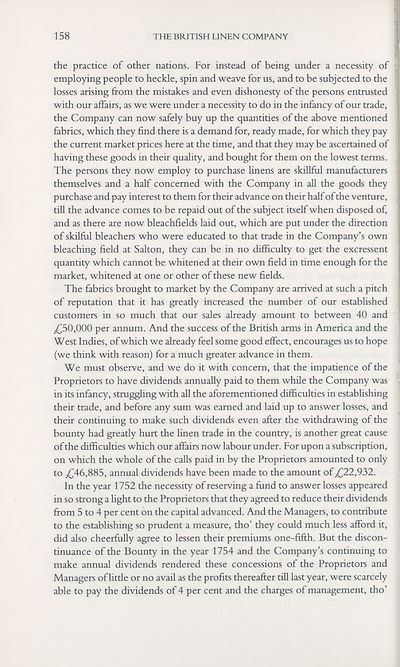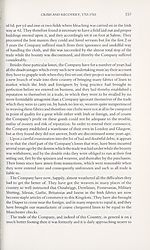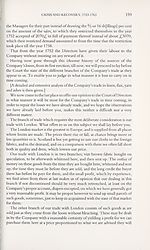Series 5 > British Linen Company, 1745-1775
(175) Page 158
Download files
Complete book:
Individual page:
Thumbnail gallery: Grid view | List view

158
THE BRITISH LINEN COMPANY
the practice of other nations. For instead of being under a necessity of
employing people to heckle, spin and weave for us, and to be subjected to the
losses arising from the mistakes and even dishonesty of the persons entrusted
with our affairs, as we were under a necessity to do in the infancy of our trade,
the Company can now safely buy up the quantities of the above mentioned
fabrics, which they find there is a demand for, ready made, for which they pay
the current market prices here at the time, and that they may be ascertained of
having these goods in their quality, and bought for them on the lowest terms.
The persons they now employ to purchase linens are skillful manufacturers
themselves and a half concerned with the Company in all the goods they
purchase and pay interest to them for their advance on their half of the venture,
till the advance comes to be repaid out of the subject itself when disposed of,
and as there are now bleachfields laid out, which are put under the direction
of skilful bleachers who were educated to that trade in the Company’s own
bleaching field at Salton, they can be in no difficulty to get the excressent
quantity which cannot be whitened at their own field in time enough for the
market, whitened at one or other of these new fields.
The fabrics brought to market by the Company are arrived at such a pitch
of reputation that it has greatly increased the number of our established
customers in so much that our sales already amount to between 40 and
,£50,000 per annum. And the success of the British arms in America and the
West Indies, of which we already feel some good effect, encourages us to hope
(we think with reason) for a much greater advance in them.
We must observe, and we do it with concern, that the impatience of the
Proprietors to have dividends annually paid to them while the Company was
in its infancy, struggling with all the aforementioned difficulties in establishing
their trade, and before any sum was earned and laid up to answer losses, and
their continuing to make such dividends even after the withdrawing of the
bounty had greatly hurt the linen trade in the country, is another great cause
of the difficulties which our affairs now labour under. For upon a subscription,
on which the whole of the calls paid in by the Proprietors amounted to only
to ,£46,885, annual dividends have been made to the amount of £22,932.
In the year 1752 the necessity of reserving a fund to answer losses appeared
in so strong a light to the Proprietors that they agreed to reduce their dividends
from 5 to 4 per cent on the capital advanced. And the Managers, to contribute
to the establishing so prudent a measure, tho’ they could much less afford it,
did also cheerfully agree to lessen their premiums one-fifth. But the discon¬
tinuance of the Bounty in the year 1754 and the Company’s continuing to
make annual dividends rendered these concessions of the Proprietors and
Managers of little or no avail as the profits thereafter till last year, were scarcely
able to pay the dividends of 4 per cent and the charges of management, tho’
THE BRITISH LINEN COMPANY
the practice of other nations. For instead of being under a necessity of
employing people to heckle, spin and weave for us, and to be subjected to the
losses arising from the mistakes and even dishonesty of the persons entrusted
with our affairs, as we were under a necessity to do in the infancy of our trade,
the Company can now safely buy up the quantities of the above mentioned
fabrics, which they find there is a demand for, ready made, for which they pay
the current market prices here at the time, and that they may be ascertained of
having these goods in their quality, and bought for them on the lowest terms.
The persons they now employ to purchase linens are skillful manufacturers
themselves and a half concerned with the Company in all the goods they
purchase and pay interest to them for their advance on their half of the venture,
till the advance comes to be repaid out of the subject itself when disposed of,
and as there are now bleachfields laid out, which are put under the direction
of skilful bleachers who were educated to that trade in the Company’s own
bleaching field at Salton, they can be in no difficulty to get the excressent
quantity which cannot be whitened at their own field in time enough for the
market, whitened at one or other of these new fields.
The fabrics brought to market by the Company are arrived at such a pitch
of reputation that it has greatly increased the number of our established
customers in so much that our sales already amount to between 40 and
,£50,000 per annum. And the success of the British arms in America and the
West Indies, of which we already feel some good effect, encourages us to hope
(we think with reason) for a much greater advance in them.
We must observe, and we do it with concern, that the impatience of the
Proprietors to have dividends annually paid to them while the Company was
in its infancy, struggling with all the aforementioned difficulties in establishing
their trade, and before any sum was earned and laid up to answer losses, and
their continuing to make such dividends even after the withdrawing of the
bounty had greatly hurt the linen trade in the country, is another great cause
of the difficulties which our affairs now labour under. For upon a subscription,
on which the whole of the calls paid in by the Proprietors amounted to only
to ,£46,885, annual dividends have been made to the amount of £22,932.
In the year 1752 the necessity of reserving a fund to answer losses appeared
in so strong a light to the Proprietors that they agreed to reduce their dividends
from 5 to 4 per cent on the capital advanced. And the Managers, to contribute
to the establishing so prudent a measure, tho’ they could much less afford it,
did also cheerfully agree to lessen their premiums one-fifth. But the discon¬
tinuance of the Bounty in the year 1754 and the Company’s continuing to
make annual dividends rendered these concessions of the Proprietors and
Managers of little or no avail as the profits thereafter till last year, were scarcely
able to pay the dividends of 4 per cent and the charges of management, tho’
Set display mode to:
![]() Universal Viewer |
Universal Viewer | ![]() Mirador |
Large image | Transcription
Mirador |
Large image | Transcription
Images and transcriptions on this page, including medium image downloads, may be used under the Creative Commons Attribution 4.0 International Licence unless otherwise stated. ![]()
| Scottish History Society volumes > Series 5 > British Linen Company, 1745-1775 > (175) Page 158 |
|---|
| Permanent URL | https://digital.nls.uk/127333149 |
|---|
| Description | Over 180 volumes, published by the Scottish History Society, containing original sources on Scotland's history and people. With a wide range of subjects, the books collectively cover all periods from the 12th to 20th centuries, and reflect changing trends in Scottish history. Sources are accompanied by scholarly interpretation, references and bibliographies. Volumes are usually published annually, and more digitised volumes will be added as they become available. |
|---|


